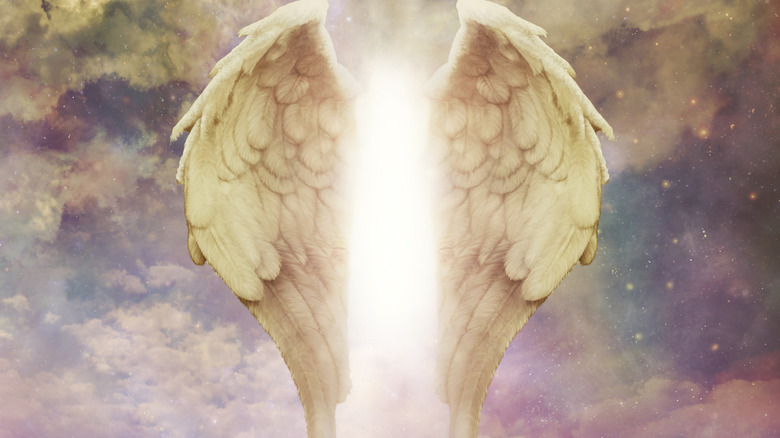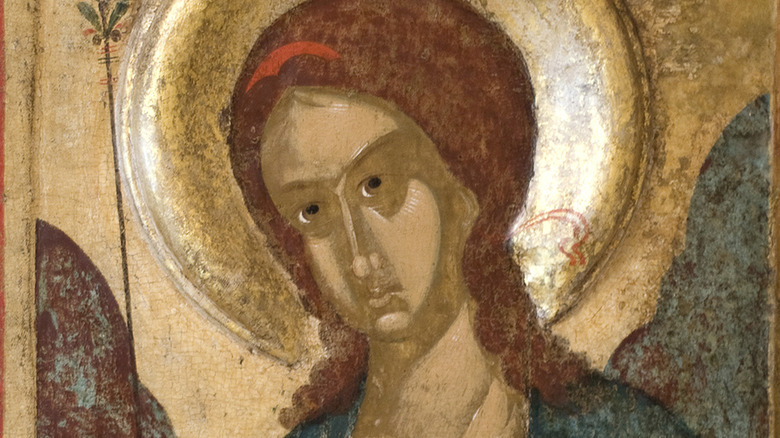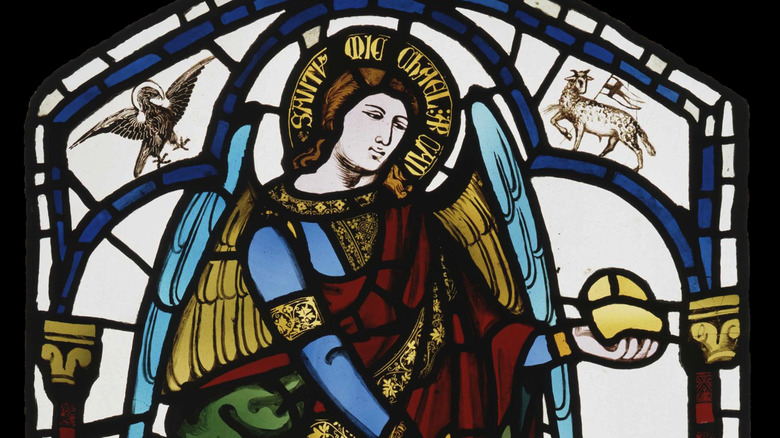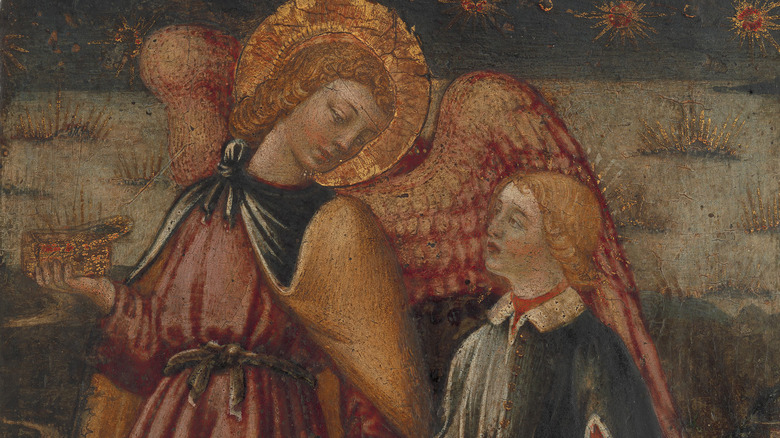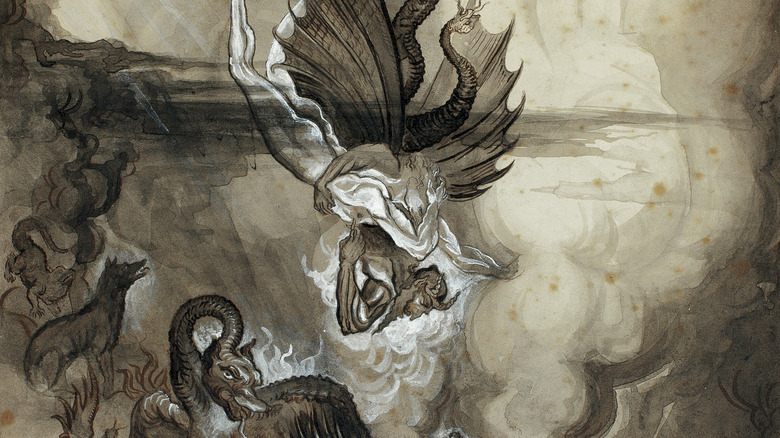The Only Angels With Names In The Bible
Angels, key figures in the Bible, are often depicted in art as gentle, winged creatures resembling adult humans, or as little babies (cherubs). A Southern California baseball team bears their name.
If Christendom were to stick with portraying angels as they're described in the Bible, however, we may not be so inclined to name cities and baseball teams after them. They frequently are described as looking nothing like popular culture presents them. When they appear in Scripture, sometimes they provide comfort, but they can also inspire terror. Look no further than Luke 2:9: "And, lo, the angel of the Lord came upon (the shepherds), and the glory of the Lord shone round about them: and they were sore afraid," although that's often followed (as in this case) with the angels offering reassurance: "Fear not," or "Do not be afraid" (depending which Biblical translation you're using).
Though they're important figures in the Biblical narrative, these frequent messengers of God are rarely given specific names in the Bible. That number can vary, also depending on which translation you're using.
Gabriel: 'I Stand in the Presence of God'
The angel Gabriel makes his first appearance in Scripture in the book of Daniel 8:17. In this verse, Gabriel helps Daniel interpret visions.
Gabriel also appears in the New Testament, in Luke 1:19. The author opens his narrative by laying the groundwork for the birth of Jesus, telling about the events surrounding the birth of John the Baptist. John's parents, Zacharias and Elizabeth, were well past child-bearing age, but the angel appears to Zacharias to tell him that Elizabeth will give birth. Zacharias is a bit taken aback, but the angel reassures him, and in the process, reveals his name. "And the angel answering said unto him, I am Gabriel, that stand in the presence of God; and am sent to speak unto thee, and to shew thee these glad tidings," he tells Zacharias, whom he then punishes for his disbelief by making him unable to speak until a few months later, when the baby was born.
Gabriel is also an important figure in Islam. According to the New World Encyclopedia, he appears in the Quran and is credited with appearing to the prophet Mohammed and revealing the words of the sacred text to him.
Michael and his angels fought against the dragon
Archangel Michael shares several similarities with his colleague Gabriel, including being first mentioned in the Book of Daniel. He is also an important figure in Islam as well as in Christianity and Judaism.
Michael is first described in the Old Testament, in Daniel 12:1, where he plays a role in a prophecy being given to Daniel: "And at that time shall Michael stand up, the great prince which standeth for the children of thy people: and there shall be a time of trouble, such as never was since there was a nation even to that same time." Michael reappears in scripture in the New Testament, where he's again portrayed as being involved in a battle. In Revelation 12:7, the writer speaks of a war in heaven in which Michael plays a role. "And there was war in heaven: Michael and his angels fought against the dragon," the passage reads.
Like Gabriel, Michael also appears in the Quran. According to Britannica, he's referred to as Mikal (or something similar, depending on transliteration).
Raphael: 'One of the Seven, Who Stand Before the Lord'
Raphael, unlike Gabriel and Michael, does not appear in any of the 66 books of the Bible considered canonical by the world's non-Catholic Christians. However, he does appear in a book in the Catholic canon, according to Catholic News Agency, making his appearance in the Book of Tobit. According to the United States Conference of Catholic Bishops, the book describes the trials and tribulations of Tobit, who is blind, and a widow named Sarah, both of whom beg for death because of their miserable lots in life. The angel Raphael appears to them in human form before ultimately setting things right. "I am Raphael, one of the seven angels who stand and serve before the Glory of the Lord," he says (Tobit 12:15).
Though he's not mentioned by name in Protestant canonical scripture, Catholic News Agency speculates that a passage in John 5:4, which mentions an angel but doesn't provide a name, actually refers to Raphael.
Lucifer: a special case
Some angels can be terrifying. The name Abaddon is mentioned in various spots, but is identified as an angel in the New Testament Book of Revelation, which refers to Abaddon as "the angel of the bottomless pit" (Revelation 9:11).
In a similar vein, the word "Lucifer" does appear in some translations of the Bible, though not all. According to History, Lucifer is just one of several names given to Satan, in both the Bible and in Christian teaching. Other names used include the Devil, Baphomet, and Beelzebub.
According to Isaiah 14:12, the Devil is a fallen angel who, following a rebellion against God, was cast into hell. The prophet Isaiah writes, "How art thou fallen from heaven, O Lucifer, son of the morning! how art thou cut down to the ground, which didst weaken the nations!" Focus on the words "morning star" in that passage: That's another name for the planet Venus, the brightest object in the sky at dawn and/or dusk. The word "Lucifer," which means something akin to "light-bringer," may have been that fallen angel Isaiah was referring to. The broader perception of Lucifer as the name of a specific fallen angel, however, probably owes more to John Milton's "Paradise Lost" (per Britannica) and Dante's "Inferno" (also via Britannica) than the Bible.
